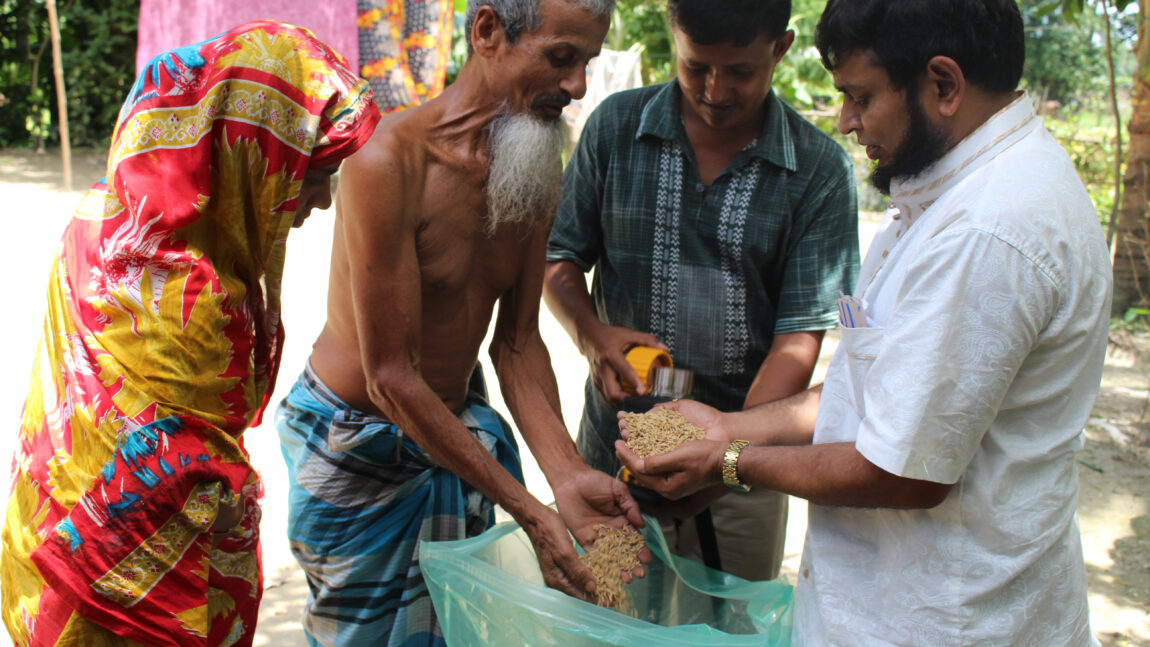Innovation Scaling: Hermetic Bags

Postharvest losses are usually concentrated at the storage stage. Over the past decade, ADMI has strongly prioritized research, development, and promotion of various hermetic storage technologies such as hermetic bags, cocoons, and modified metal silos in India and Bangladesh.
HERMETIC BAGS
ADMI Grain Handling Technique
Bangladesh Agricultural University helped pioneer the ADMI Grain Handling technique of pairing hermetic storage with the BAU-STR dryer. In partnership with civil society organizations such as the Ara Bangla Society, BAU has worked with numerous farmer groups, including women’s groups, to encourage adoption of hermetic storage coupled with dryer usage, especially for paddy seed storage.
Technology demonstration through the ADMI Village
From 2015-2018, ADMI invested in the development of the ADMI Village in the state of Bihar, India. Together with partners Bihar Agricultural University, Dr. Rajendra Prasad Central Agricultural University, and the Borlaug Institute for South Asia (BISA), the ADMI Village focused on reducing postharvest losses of in wheat, rice, maize, and lentil crops in five districts in Bihar.
At the ADMI Village, ADMI researchers identified appropriate technology interventions, including hermetic bags, and created a technology demonstration and training hub, bringing together experts and smallholder farmers. The ADMI Village project worked with close to 10,000 farmers in 50 villages in Bihar improving awareness of postharvest issues and solutions through training on safe storage practices using hermetic bags. Training was accompanied by the distribution of more than 6,000 hermetic bags – both free and subsidized.
Scaling hermetic solutions in Bihar
In 2019, ADMI initiated a new partnership with BISA to scale postharvest solutions in Bihar through the Government of Bihar’s Climate-Smart Agriculture program. In partnership with BISA, ADMI reached 75 Climate-Smart Villages in six districts in Bihar through distribution of hermetic bags, provision of drying services, and focused drying and storage training for farmers.
Through field demonstrations, farmer trainings and awareness campaigns, the project reached more than 6,000 farmers in Bihar with hermetic technology, drying technologies, and basic postharvest loss awareness and prevention methods. More than 18,000 hermetic bags were distributed in 75 villages during 2019-20. In the second year of the project, the project worked with local retailers and entrepreneurs to encourage subsidized sales of hermetic bags.
COVID-19 lockdowns increased the use of digital mobile platforms, and the project launched multiple farmer WhatsApp groups to encourage peer-to-peer learning and communication with project trainers. Trainers developed simple videos on proper use of hermetic bags, shared via WhatsApp.
METAL BINS
While the benefits of hermetic bags have been researched and demonstrated, in Bangladesh they face barriers in adoption due to government restrictions on single-use plastics and associated high tax rates. With ADMI’s support, BAU designed and developed a contextually appropriate durable near-hermetic metal bin that can be locally produced.
Supported by ADM Cares funding, BAU fabricated and distributed 200 near-hermetic metal bins of 50 kg and 100 kg capacities. The bins are currently undergoing field-testing in 100 farm households in Mymensingh. The development of the metal bin was coupled with fabrication training for 14 local workshop owners.
COCOONS
One path to addressing storage losses in the public and private sector is by scaling hermetic cocoons for off-farm storage.
ADMI and the International Food Policy Research Institute (IFPRI) South Asia supported BAU in work with Moti Auto Rice Mill and the Bangladesh Agricultural Development Corporation (BADC) to set up hermetic cocoons to demonstrate their use and functionality and test the technical and financial feasibility for grain storage and seed storage.
In a partnership with Moti Auto Rice Mill, BAU researchers piloted multiple 5-ton hermetic cocoons and evaluated them over a four-month period. BAU also focused on training warehouse staff on proper use of the hermetic cocoons and evaluated different business models for continued use of the cocoons. The research identified a specific type of cocoon that offered the greatest economic and technical performance.
With BADC, the Government of Bangladesh’s seed-producing institution which supplies 38% of rice seed in the country, BAU research showed that use of 30-ton hermetic cocoons reduces the need for and cost of fumigation or insecticide treatment, re-drying and re-lotting, and periodic moisture measurement and germination tests.

